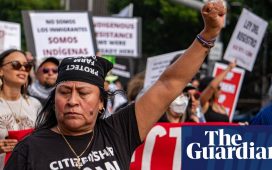Donald Trump’s vow to deport millions of undocumented immigrants has no “price tag”, the president-elect has said, setting the scene for a confrontation between his incoming administration and Democratic officials across the US.
As Democratic state governors and mayors signalled their determination to resist the most extreme elements of his agenda, Trump promised that his campaign pledge to expel an estimated 11 million people – though Trump himself has given a figure as high as 21 million – would be implemented come what may.
“It’s not a question of a price tag,” Trump told NBC.
“Really, we have no choice. When people have killed and murdered, when drug lords have destroyed countries, and now they’re going to go back to those countries because they’re not staying here. There is no price tag.”
The American Immigration Council has estimated that mass deportation on the scale Trump envisions could cost $315bn, including the broader economic costs through the impact on the US labour market.
Trump’s comments, given in a phone interview with the network’s Kristen Welker, reinforced an uncompromising message declared to his supporters on election night as victory became certain. “I will govern by a simple motto: promises made, promises kept,” he said.
But the renewed deportation vow has set him on a collision course with Democratic state officials who said they would push back amid separate reports that the new Trump administration would defund states, cities and law enforcement agencies that did not cooperate or operate sanctuary policies for immigrants.
NBC News reported that Trump could withhold federal grants from police and sheriffs’ departments that refused to participate in programmes to round up immigrants.
Democratic officials lined up to say they were prepared to stand against Trump’s plan.
In California– home to one of the country’s largest immigrant population – the governor, Gavin Newsom, called a special state legislative session next month to “safeguard California values and fundamental rights in the face of an incoming Trump administration”.
Karen Bass, the mayor of Los Angeles – where one-third of the population is foreign-born – issued a statement of solidarity with its residents.
“No matter where you were born, how you came to this country, how you worship or who you love, Los Angeles will stand with you,” she said. “This is not a time for despair, this is a time for action. I’ve spoken with leaders across the city, the state and the country. We are ready.”
JB Pritzker, the governor of Illinois, announced plans to ask state legislators to address potential threats from Trump’s second presidency. “You come for my people, you come through me,” Pritzker told journalists.
Kathy Hochul, the Democratic governor of New York, said she would attempt to work with the new Trump administration but vowed to resist moves to restrict reproductive freedoms, roll back environmental control or loosen gun controls.
“If you try to harm New Yorkers or roll back their rights, I will fight you every step of the way,” she said in remarks aimed directly at Trump.
Concern over the effect of Trump’s immigration policy reached Canada, where officials have stepped up border security in preparation for an increase of immigrants fleeing anticipated round-ups and deportations.
Canada’s federal police said more people crossing the country’s border with the US between 2016 and 2023, related to Trump’s first win, had “provided us with the tools and insight necessary to address similar types of occurrences”.
The public safety minister, Dominic LeBlanc, told reporters that both the Royal Canadian Mounted police and the country’s border services were “ready for any eventuality”, adding that contingency plans had been in place for “several months”.
The outgoing Biden administration announced it was preparing to address a contrary concern: a mass upsurge of illegal border crossings into the US through its southern border before Trump takes office on 20 January, as smugglers seek to push people through before an expected crackdown is launched.
Concern over Trump’s intentions has also reached the armed forces, with the Pentagon bracing itself for upheavals amid consternation about his repeated campaign threats to use the military to crush internal dissent.
After Tuesday’s election victory, Lloyd Austin, the defence secretary, addressed the matter directly in a written memo, the Washington Post reported. He promised that the Pentagon would conduct a “calm, orderly, and professional transition to the incoming Trump administration”.
“As it always has, the US military will stand ready to carry out the policy choices of its next Commander in Chief, and to obey all lawful orders from its civilian chain of command,” Austin wrote. He added that the military must “continue to stand apart from the political arena”.
General John Kelly, Trump’s former chief of staff in his first term, told journalists during the campaign that Trump had repeatedly mused that he hankered after having military commanders that were personally loyal to him in the manner German generals showed Adolf Hitler.
Rachel VanLandingham, a former US air force attorney, said dangers of the military being used to suppress internal opposition were high.
“They will follow President Trump’s orders, particularly because the president can lawfully order domestic use of the military in a wide variety of situations,” she told the Post.
“There is huge risk in disobeying a president’s order, and seemingly little risk in obeying it.”








